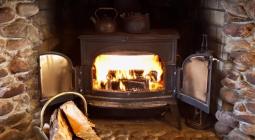Just four fines issued for wood-burning complaints in a year in England
Law around illegal wood burning in smoke-control areas is not being enforced, campaigners say
Only four fines out of 5,600 complaints have been issued for illegal burning of wood in smoke-control areas from September 2023 to August 2024 in England, data has revealed.
The new data, from freedom of information requests submitted by the campaign group Mums for Lungs, shows that the law around illegal wood burning is not being enforced in England, campaigners said.
A recent survey by Global Action Plan found 22% of the UK public use an open fire and/or wood-burning stove in their home. It also found that 37% of Londoners surveyed said they use an open fire and/or a wood-burning stove in their home, despite the capital being a smoke-control area.
In smoke-control areas, which have higher levels of pollution, people can only burn wood and other unauthorised fuels in government-approved stoves and other appliances. This is because the approved appliances have air control mechanisms that improve combustion efficiency and reduce the amount of harmful particles released.
Since the Environment Act became law in 2021, in England, in theory, you can be fined a penalty of up to £300 if your chimney releases smoke in a smoke-control area. You can be fined up to £1,000 if you buy unauthorised fuel to use in an appliance that has not been approved by Defra.
Jemima Hartshorn, co-founder of Mums for Lungs, said: “If you open your door on a cold night in any town, city or village you can smell the wood pollution. You wouldn’t want a truck pumping air pollution into your front room, but ironically even modern wood stoves cause six times the fine particle pollution of an HGV.
“We’ve known about the health impacts of wood burning for decades. We need to make sure councils are given the tools and resources to protect children from toxic pollution and not just talk about the risks. The current system is obviously not fit for purpose.”
Some local authorities are particularly lax at enforcing the rules. In Birmingham, there were 783 complaints made but despite this, the council did not issue a single enforcement letter or carry out an inspection. Manchester city council received 213 complaints, but issued just seven warning letters; while Cheshire East had 141 complaints, but took no action.
Dirty air causes 26,000 to 40,000 early deaths a year in the UK, and the particles are linked to many other health problems including dementia and depression. Wood burning has overtaken traffic in the UK as one of the most harmful sources of the smallest particles, known as PM2.5. These particles are less than 2.5 micrometres in diameter, small enough to get into the human lung. According to a growing body of research, they are responsible for a wide range of health problems. These include heart and lung disease, as well as diabetes, cancer, impaired brain function and premature births.
Earlier this year, government data revealed that a rise in harmful emissions from wood-burning stoves has helped undermine decreases in particulate pollution from road and energy sources in the UK.
The Royal College of Paediatrics and Child Health has said that wood burning should be phased out.
RCPCH clinical fellow Dr Alice Willson said: “Wood burning releases harmful PM2.5 particles, contributing significantly to both indoor and outdoor pollution. Many people are unaware of the severe health risks, especially for children whose developing lungs make them particularly vulnerable to all forms of air pollution. In our recent position statement, we called for phasing out domestic wood burning in urban areas to reduce air pollution. Taking steps such as this will not only protect child health, but also the health of the planet.”
Cover photo: In smoke-control areas, people can only burn wood and other unauthorised fuels in government-approved stoves and other appliances. Photograph: Andy Nash/Getty Images/iStockphoto




